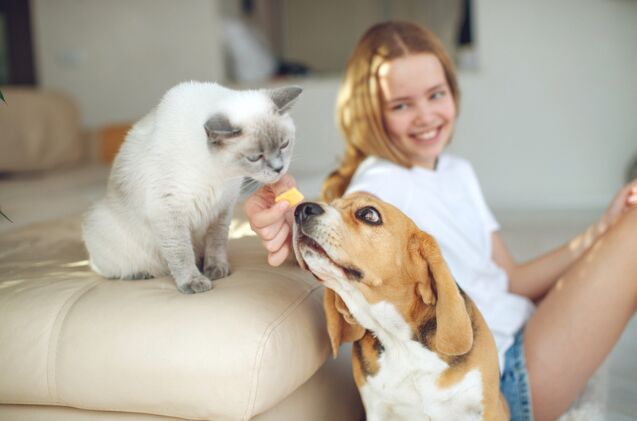Survey Reveals the Most Common Pet-Related Myths Pet Parents Believe

With the growing wealth of online information, the answers to all your questions are just a click away – but how much of that information can be trusted? There have always been myths and misconceptions within the pet industry, but experts warn that this misinformation is bigger than ever.
A recent study conducted by OnePoll with Stella & Chewy’s, a well-respected pet food brand, revealed that a startling 92% of pet parents still believe myths about their pets.
These common myths include everything from basic pet anatomy, overall health and wellness, dietary needs and concerns, and basic pet care. While some of these myths are harmless, just a funny misunderstanding, others can have a significant impact on your pet’s health and well-being. In fact, of the 2000 survey participants, nearly half reported that knowing how to best care for their pet with the conflicting information available can be difficult.
For example, it has long been stated that a cold, wet nose on a dog means that they are in good health, with 38% believing this outdated information. The truth is that your dog’s nose likely only feels wet because your dog recently licked it. While this can improve their sense of smell, it’s not a reliable indicator of your dog’s health.
Some other pet care myths addressed by the survey include:
- 42% of cat parents believe their cat can see in complete darkness. They CAN see in very low light conditions, but not in a complete absence of light.
- 41% of cat parents believe that cats always land on their feet. The hard truth is that your cat is more likely to land on their feet, but it can be impacted by many critical factors, including their overall health. Conditions that affect their balance or mobility may prevent them from landing safely.
- 29% of cat parents believe that cats enjoy milk. Cat’s milk (which can be purchased at many pet stores) is a great option, but many cats are actually lactose intolerant.
- 68% of dog parents believe a wagging tail is always a sign of happiness. This body language is essential for dog lovers to understand because, depending on how your dog’s tail is wagging and other body language indicators, it could mean your dog is overly alert or stressed.
In addition to exploring these basic pet care myths, the survey then drilled down into even more diet and nutrition-focused questions.
More than a quarter of the dog parents surveyed believed homemade pet foods are always healthier than store-bought diets. But this fails to address the importance of proper nutritional balance and the fact that many homemade meals created by well-meaning pet parents may lead to nutritional deficiencies. Of the cat parents surveyed, 30% believed it wasn’t safe for their cats to eat any human food. But some human foods are not only safe; they could also help support your cat’s health or address specific health conditions. For example, pumpkin has been found to improve digestion and even manage hairballs naturally.
The study highlights a significant gap in information regarding dietary needs, available foods, and our pets’ health.
“Half of pet parents admitted that they don't know much about raw diets,” explained Rob Nelson, Vice President, Brand, at Stella & Chewy’s. “Frozen raw and freeze-dried raw pet food are two great alternative diet options for pets and have a wide array of benefits, including increased energy, strong joint health and more. A raw diet is also the closest thing to a pet’s ancestral diet, and it’s easy to feed your furry friend – all key components to ensuring pet parents are giving their pets the raw love they deserve.”
If you are unsure about your pet’s dietary needs or if you are currently providing them with a balanced diet, contact your veterinarian or a Board-Certified Pet Nutritionist for more information.

Britt Kascjak is a proud pet mom, sharing her heart (and her home) with her “pack” which includes her husband John, their 2 dogs – Lucifer and Willow – and their 3 cats – Pippen, Jinx, and Theia. She has been active in the animal rescue community for over 15 years, volunteering, fostering and advocating for organizations across Canada and the US. In her free time, she enjoys traveling around the country camping, hiking, and canoeing with her pets.
More by Britt























